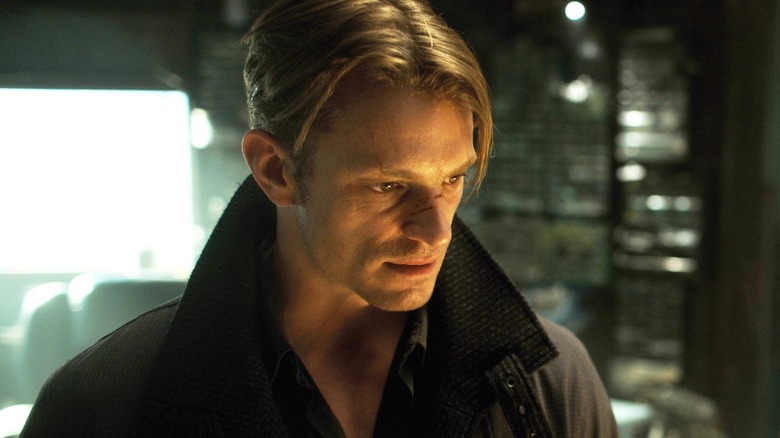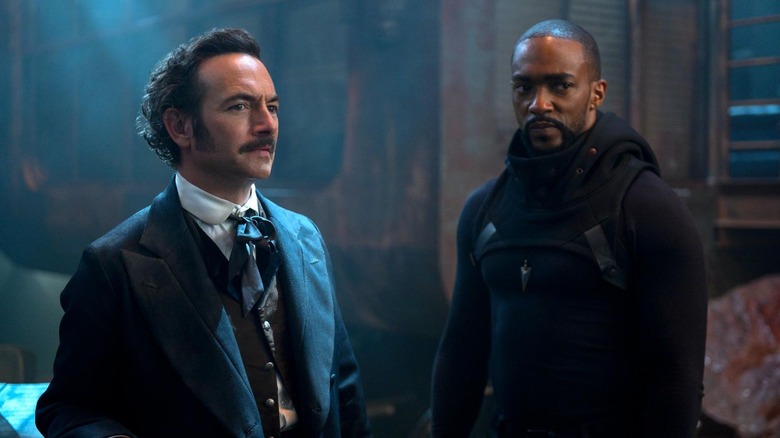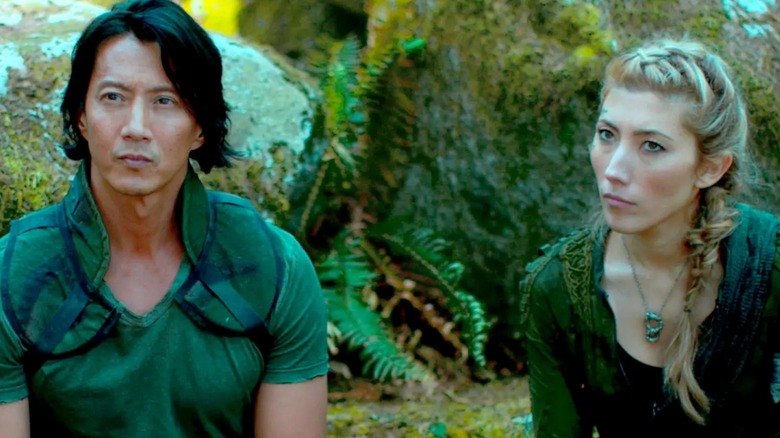Why Netflix Canceled Altered Carbon
There has always been more to cyberpunk than the core premise of being more than human. It might also be tempting to boil down the genre to mere aesthetics: futuristic, neon-drenched metropolises, cutting-edge technology, and a society simultaneously on the brink of progress and ruin. However, cyberpunk narratives routinely critique the oversaturation of capitalist ideology while highlighting mankind's fraught relationship with technological progress. These stories are also overtly political, where shadowy organizations and corrupt megacorporations hold a corrosive monopoly over people's lives, going as far as digitizing consciousness in the name of progress.
Although all of these genre traits find a way to compound in Richard K. Morgan's 2002 novel "Altered Carbon," humanity emerges as the most intriguing aspect of such a dystopian world. Just when you think you've seen it all before, "Altered Carbon" jolts you awake with the ingenuity and cynicism necessary for cyberpunk to thrive as a genre. The novel wears its influences on its sleeve — from William Gibson's "Sprawl" trilogy to Philip K. Dick's "Do Androids Dream of Electric Sheep?" — but Morgan dials the genre-specific lurid violence and hedonism to a 100. He also compels us to get philosophical with the idea of a body being "re-sleeved" forever, as a dystopian society rarely takes the most critical part of the human experience into consideration: the soul.
Netflix's interpretation of Morgan's "Altered Carbon" is an intriguing one. On the one hand, it relies on the gimmicks that help every cyberpunk sci-fi show sell, but treats these tropes well enough to warrant high praise. The show's Takeshi Kovacs, a hardened mercenary who wakes up 300 years after his previous sleeve is killed, is the perfect vehicle for the kind of ultraviolent cynicism that the story demands. While critics highly favored this Netflix show despite its flaws, "Altered Carbon" was abruptly canceled after just two seasons. Is this yet another instance of a streaming service's fickle approach to emerging stories, or is there a more practical reason behind the cancellation? Let's dive into it.
Altered Carbon turned out to be much more expensive than anticipated
Season 2 of "Altered Carbon" finished airing in February 2020, so post-finale talks about a potential third season were inevitably drowned out by the COVID-19 pandemic. When news about the show's cancellation broke in August, it was natural to assume that the pandemic might've caused enough setbacks to warrant this decision. After all, uncertainty over air dates and increased budgets were staple issues that most shows had to contend with during that frame of time, especially one that had such a huge ensemble cast. However, the abrupt end of "Altered Carbon" wasn't Covid-related at all, as all signs point to low viewership rates for season 2, which impacted conversations surrounding the cost of renewal.
Netflix's policy surrounding the renewal of a series (at the time) can be better understood via the following statement made in 2018 by Cindy Holland, Netflix's former VP of original programming (via Digital Spy):
"The biggest thing that we look at is, are we getting enough viewership to justify the cost of the series? We also look at other things: how beloved the fan community is, how social a title is. There are lots of other things that we look at that."
Although "Altered Carbon" was no "Black Mirror," it was topical enough to trigger discourse about boundary-pushing sci-fi shows on Netflix, along with its contribution to the cyberpunk genre. It was, however, quite expensive to make, as the premise in itself was heavily reliant on meticulously crafted props and detail-heavy sets that conveyed a sickening sense of overconsumption and technological progress.
Overstimulation is the name of the game here, especially for the wealthy who have declared monopoly over the skies (as opposed to the Grounders, whose socioeconomic circumstances have forced them to stay on land, which is perceived as inferior). It was also a show that demanded great variety, as the look-and-feel of a waterbody-dominant planet like Harlan's World would be significantly different than the Earth-adjacent melting pot of Latimer.
Although Netflix hasn't released the viewership rates or estimated budget for "Altered Carbon," season 1 lead Joel Kinnaman previously told Yahoo! News that the show had "a bigger budget than the first three seasons of 'Game of Thrones.'" Some sources claim that the cost of each episode was close to $7 million (!), but Kinnaman's claim easily points to a much higher number.
Budgetary issues aside, Altered Carbon was doomed to fail as a cyberpunk series
It is not controversial to say that the show's first season is superior to its follow-up: A sentiment that rings true despite the acknowledgement that "Altered Carbon" has been deeply flawed since day one. The novelty of the first installment immediately wears off in season 2, thanks to a drastically altered approach to the story, which shifts its gaze away from obsessive hyper-specifics. Season 1 juggles two versions of Kovacs — Will Yun Lee as the "original" Kovacs and Joel Kinnaman as the newly-sleeved one — and these disparate versions seem intricately connected despite sporting a great divide.
After all, love transcends time, along with the limitations of the (im)mortal coil, leading Kovacs to search for a long-lost love with the single-minded hunger for reconnection, no matter the cost. This connects perfectly to season 2, where Kovacs moves on to a new sleeve (played by Anthony Mackie), triggering a brand new journey that must find a way to connect to the ones still lingering in the ether.
To state the obvious, Mackie breathes new life into Kovacs, infusing the character with a humorous edge that was wholly absent before. There's a commendable range and dynamism to this performance, where the actor leverages his natural charisma to blend in and out of chaotic situations even when he's driven by the same goals as his predecessors. This, however, is the issue: Takeshi Kovacs does not smile or joke around, nor does he wield charm like an extension of himself. Mackie's Kovacs feels like a completely different iteration of the character, which inadvertently betrays the show's central theme, which argues that the soul persists, no matter how many sleeves are inhabited. Kovacs, for better or worse, is a tough, intimidating presence, trained to hone his body into a multi-use weapon.
Even without this fatal disconnect, "Altered Carbon" feels more generic by the second season, despite a tighter control over the story and the general direction of the series. As I've stated above, cyberpunk has infinitely more to offer than its associated aesthetics, but season 2 makes the baffling decision to abandon its meticulous, high-concept roots and revel in the shallow stylistic excess of a cyberpunk world. Moreover, the adaptation's vision strays so far away from that of Morgan's novels that the end result is unrecognizably bland. What we're left with in the end is an empty world that self-immolates due to its disturbing lack of depth or originality.


